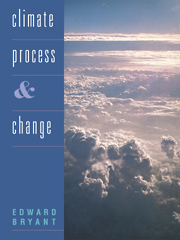Book contents
7 - Human effects on climate
Published online by Cambridge University Press: 05 June 2012
Summary
INTRODUCTION
The purpose of this chapter is to outline the mechanisms of enhanced ‘greenhouse’ warming, and to describe the computer-based predictions for that warming. However, many popularised views of future climate change do not acknowledge the uncertainties that lie behind these scenarios. Nor do they acknowledge the fact that other mechanisms may be responsible for the climate change that is currently being measured. These aspects also are examined, specifically issues related to: ‘greenhouse’ gas sinks; the nature of temperature changes; the importance of negative feedback mechanisms such as clouds, sulphate aerosols and dust in controlling temperature; and the efficiency of computer simulation in modelling the climatic impact of enhanced ‘greenhouse’ gases. The ‘greenhouse’ debate has been obscured by speculation about the possible deterioration of stratospheric ozone through the production of manufactured halocarbons. In many respects, both scenarios overlap, with some of the effects of ‘greenhouse’ warming exacerbating the potential for ozone destruction in the upper atmosphere. These aspects are described. Finally, in the 1980s, nuclear war was hypothesised as having the potential profoundly to cool the globe. Few scientists would support that hypothesis now because it is seriously flawed. The scenario for ‘nuclear winter’ is described as a cautionary lesson that not all scientific proposals for climate change are valid.
ENHANCED ‘GREENHOUSE’ WARMING
Discovery
(National Research Council, 1983; Bryant, 1993)
The potential effect of atmospheric changes in carbon dioxide induced by human activity has been the subject of scientific enquiry for the past 130 years.
- Type
- Chapter
- Information
- Climate Process and Change , pp. 117 - 150Publisher: Cambridge University PressPrint publication year: 1997



